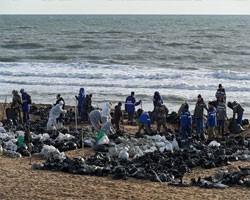Banking Current Affairs
| International Relations |
|---|
|
|
|
Context
In a severe environmental crisis, Russia has declared a federal-level emergency in response to a catastrophic oil spill along the Black Sea coast. The spill, caused by damaged oil tankers during a storm, has led to widespread pollution, affecting marine ecosystems, local communities, and the coastal economy. Timeline of the Disaster The Spill Incident: On December 15, two Russian-flagged oil tankers were damaged near the Kerch Strait during a storm. Thousands of tons of heavy fuel oil (mazut) spilled into the Black Sea, polluting 55 kilometers (34 miles) of coastline. Escalation of the Crisis: Initial cleanup efforts by local authorities were inadequate, prompting the Krasnodar region to declare a regional state of emergency. Thousands of volunteers joined the cleanup, but the scale of pollution required federal intervention. Federal-Level Emergency Declared: On December 21, Russia’s Emergency Situations Minister, Alexander Kurenkov, declared a federal-level emergency to allocate resources and funds for intensified cleanup operations. Environmental Impact Extent of Pollution: 200,000 tons of soil along the Black Sea coast have been contaminated with heavy fuel oil. The spill has caused severe damage to marine life and ecosystems. Affected Communities: Coastal areas face high levels of oil pollution, impacting tourism-dependent economies. Beaches and waters may remain unsafe, deterring tourists during spring and summer seasons, leading to long-term economic consequences. Government Response Emergency Measures: Federal emergency declaration allows: Mobilization of resources from the federal budget. Deployment of specialized equipment and personnel. Coordination between local, regional, and federal agencies to expedite cleanup. Criticism of Initial Efforts: Local residents criticized the response as disorganized and under-resourced, exacerbating the disaster’s impact. Expert Warnings Environmental Impact: Long-term contamination of soil and water could render the region uninhabitable for humans and wildlife. Marine life and ecosystems may suffer irreversible damage. Economic Repercussions: Tourism, a key economic driver for the region, may suffer significant losses as beaches remain polluted. Challenges Ahead Cleanup Operations: Removing heavy fuel oil like mazut requires advanced technology and expertise. Emergency workers and volunteers face health risks due to prolonged exposure to toxic substances. Restoration of Ecosystems: Long-term rehabilitation of marine and coastal ecosystems is essential. Monitoring and research will be necessary to track recovery and implement preventive measures. Conclusion The Black Sea oil spill is a stark reminder of the environmental and economic risks associated with oil transportation. Russia’s federal-level response underscores the urgency of addressing such crises with advanced technologies and coordinated efforts. Restoring ecosystems and rebuilding community livelihoods will require sustained commitment and international expertise. Source: The Hindu |
| >> More Banking Current Affairs |
